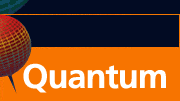CONTACTS
- Coordinator
Sebastian Deffner
-
Quantum Lunch Location:
T-Division Conference Room, TA-3,
Building 123, Room 121
 |


Quantum Institute: Visitor Schedule
The Quantum Lunch is regularly held on Thursdays in the Theoretical Division Conference Room, TA-3, Building 123, Room 121.
The organizing committee includes Malcolm Boshier (P-21), Diego Dalvit (T-4), Michael Di Rosa (C-PCS), Sebastian Deffner (T-4 & CNLS), Changhyun Ryu (P-21) , Nikolai Sinitsyn (T-4), Rolando Somma (T-4), Christopher Ticknor (T-1), and Wojciech Zurek (T-4).
For more information, or to nominate a speaker, contact Sebastian Deffner.
To add your name to the Quantum Lunch email list, contact Kacy Hopwood.
Friday May 6, 2016
12:30 PM - 2:00 PM
CNLS Conference Room (TA-03, Bldg 1690)
Speaker: Joseph Dulny (Booz Allen Hamilton Strategic Innovation Group)
Technical Host: Nikolai Sinitsyn
TOPIC: Quantum Annealer Driven Machine Learning and Optimization
Abstract
Machine learning applications are limited by computational power. Quantum annealing (QA) is a new computing paradigm that shows promise for solving complex optimization problems of the quadratic unconstrained binary (QUBO) format. In this talk, we discuss the application of QA to machine learning (ML) through experiments in natural language processing, seizure prediction, and linear separability testing. These experiments were performed on QA simulators and early-stage commercial QA hardware and compared t0 an unprecedented number of traditional ML techniques. We extend QBoost, an early implementation of a binary classifier that utilizes a quantum annealer, via resampling and ensembling of predicted probabilities to produce a more robust class estimator.
To determine the strengths and weaknesses of this approach, resampled QBoost RQBoost) is tested across several datasets and compared to QBoost and traditional ML. We find that early stage QA-enabled machine learning outperforms some, but not all traditional machine learning techniques. We consider these results encouraging given the very small number of quantum bits these early devices can make use of. Through these experiments, we provide unique insights into the state of quantum ML via boosting and the use of quantum annealing hardware that are valuable to institutions interested in applying QA to problems in ML and beyond.
|


